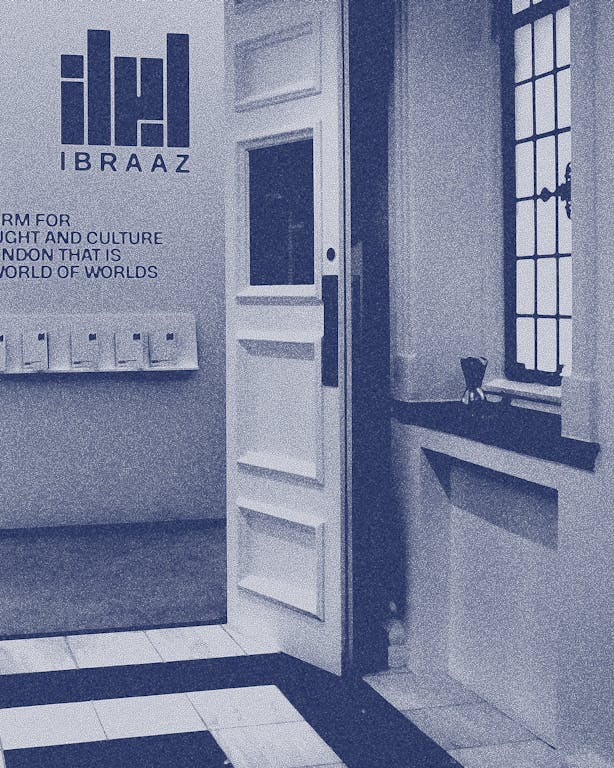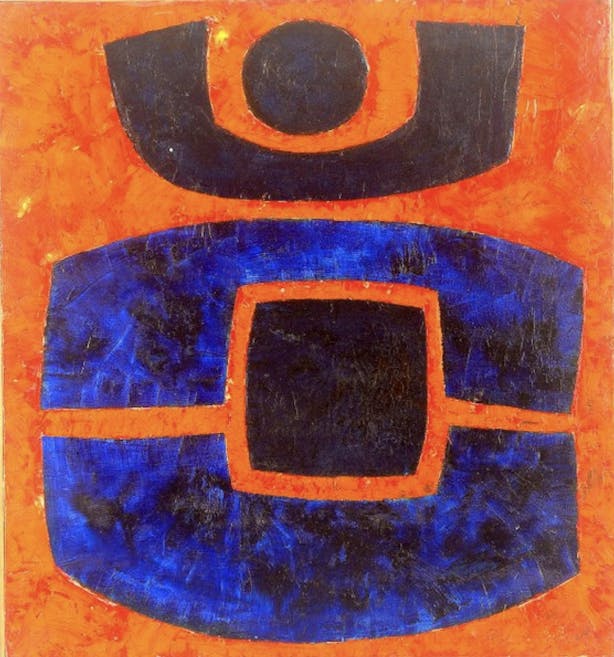
- Mission Statement
Mission Statement 00: Why Now?
This is a lightly edited transcript of Françoise Vergès’s ‘Closing Remarks’ from Ibraaz Mission Gathering 00: Why Now? which took place on 21–22 February 2025.
Speaker: Françoise Vergès
These won’t be closing remarks in the sense of a conclusion. But it will be a closing in the sense of saying goodbye, and you will see that I’m going to quote some of you but without saying who – so as not to personalise it, but you will recognise it. So, these are some remarks.
We were told that Ibraaz means ‘to shine a light on’ – and on what? We read that Ibraaz is a platform for visual culture in and around the Global South, and in particular North Africa and the Middle East. So for me, this would be a place where I would come to see what light has been shining on something that I don’t know. Or perhaps I will be invited to shine a light on something I know.
I want to stay close to the word itself: Ibraaz. In a time of darkness, a light is very important. Not the light, but a light – and we need light because, effectively, we are in a time of darkness, with Palestine, Sudan, Congo, the global counter-revolution, Islamophobia, anti-migrant and anti-refugee politics, etc. We heard a lot about the feeling of powerlessness – that we feel powerless – and I was thinking about that.
It looks like the present has been taken from us, that the present is being entirely colonised by dark reactionary forces. It’s not just that they are lying about the past: they don’t want us to have a present. True, they never wanted us to have a present, they colonise it. But now there is a certain velocity to the current colonisation of the present, and it’s global.
The past is also being denied. But that, too, has always been denied – there is nothing new with that. The present is now absolutely flooded with images and noise; we are drowning under madness. Let’s be clear, they propose a futurism – a fascist futurism. So what is our futurism?
I was also thinking about this question of powerlessness: that colonial-capitalism has always been about exhausting bodies and minds, really exhausting them, until premature death. The model of the plantation is still with us, since slavery was about exhausting bodies, soil, and minds. Life expectancy, if we can call it that, was eight to ten years in a plantation. Exhaustion remains an important element of the economy of dispossession and extraction.
I was reminded of a publication by a psychiatrist – not one of the greatest psychiatrists in the world, but the title is interesting – titled ‘The Effort to Drive the Other Person Crazy’.1 I do think there is an effort to drive us crazy, hence reappropriating the present is very important, and Ibraaz could play a role in that – learning about the past and rehearsing everyday freedom and life as we speak. Ibraaz could be the space to escape exhaustion and reappropriate the present.
We were also asked how we feel when we entered the building. Well, I felt very well, I have to say, because it was warm. It was comfortable. There are toilets. Everything is clean. Nice people are serving us coffee and tea and lunch. But beyond this, the place wants to be about education. And I say: education, education, education! Real education. Emancipatory pedagogy. Emancipatory utopia. Everywhere. It is very important today to fight the lies.
We also heard about the art and cultural space as a refuge, and we discussed speaking without fear. We spoke of fear as if this was not happening to other people. How did people overcome fear? How do we overcome fear? And what is fear? How does fear penetrate bodies and minds?
What is a refuge? I was thinking about what’s happening in Paris at the Gaîté Lyrique, a place occupied by more than 300 isolated minors from sub-Saharan Africa since the beginning of December 2024. The Gaîté Lyrique staff accepted them and suspended their programs. These kids are fifteen to seventeen. The French state does not want to recognise them as minors, even though it has signed the Convention on the Rights of the Child, because that would mean it would have to house them, and ensure education, protection, and health.
It has been very interesting to see a cultural/artistic space becoming a refuge. Not that Ibraaz must become that kind of refuge. But if we open a cultural/artistic space, we must accept the unexpected, the unforeseen – not everything should be controlled. Otherwise, what kind of refuge will it be?
Ibraaz is in the centre of London, but we heard that this is not the centre, and the centre is empty and there is no centre. Okay. Anyway, it’s a space, nonetheless, right? There is one. It might have its limits; there might be some things that are missing, though I did not see them personally. But it’s a space.
Sure, there are other spaces in London, but there are never enough spaces. We’re not going to complain because there is one more, right? I mean, what’s happening to us?
If one of Lina’s desires is to show the culture of North Africa and the Middle East, I think it’s already very important. It’s totally missing right now, especially in the time of Islamophobia. Being a European today is to prove that you are Islamophobic. That’s the European value of our time, or what they call European values.
Orientalism is still very strong. When you’re watching a TV series about the Middle East, you hear it in the music. We need to know more. We don’t know enough.
We also heard a lot about excavating, and there is still a lot to be done about excavating. Recently, I watched movies by Med Hondo again: Soleil Ô (1967), West Indies (1979), Sarraounia (1986), and My Neighbours (1971). Preparing to write about his life, I had forgotten that he founded the African Committee of Filmmakers to promote African cinema in Africa and fight against the discriminatory images of western cinema. Nobody has done any research on this committee.
I was thinking of all the newspapers and magazines that came out of North Africa and the Middle East in the 1960s and 1970s. I am talking about Jeune Afrique, about Revolution, which was published in Algiers for many years – fantastic ‘graphisme’, incredible in terms of imagination. It’s not just about the content, but about what people imagined and realised. There is a lot to be done around what is called North Africa and the MENA, and about doing things in difficult times.
We are not homeless. No. We are not.
Also, I heard some say that we have to be prepared when things go wrong. That is very important. How do we learn to prepare ourselves for when things are getting worse? There is a saying that the battle for cultural space is a battle for survival today, and I thought about Stuart Hall, who said we have to fight without guarantee. Because if we only fight when victory is guaranteed, we will stay home, and it also means that we learn as we organise, create, produce.
These things are very important: being prepared when things go wrong. How do we learn that in a place like Ibraaz? How do we learn from past struggles? How did others deal with difficult times? Rasha [Salti] was talking about Chile, Pinochet’s coup; people survived and people continued to create. So what can we learn? That things can be difficult but also full of joy. There is always a production of counter-narratives and counter-images. People never stop producing them, and we can find how they did it. There is a vast library.
To go back to the isolated minors at Gaîté Lyrique. I talked to them about Ousmane Sembène and Med Hondo, who were cooks and worked in many underpaid jobs. I told them: ‘One day you could become a filmmaker, your destiny is not to be a cleaner. To become an artist, you don’t necessarily have to go through school. Just because you are poor and Black and Muslim, you are not condemned to being exploited.’
There is a possibility for Ibraaz to not necessarily become a school, but to offer a place to learn.
I remember Kader Attia talking about going as a teenager to the Louvre when it was free, and how it gave him the desire to become an artist. That’s also the unexpected – you open doors, and then kids will do their own things, and that’s fantastic.
We have to be much more open, much more flexible. We do what we have to do. We unlearn as we learn. We do as we are doing. We trust ourselves. We trust our imagination. We trust our capacity.
Yesterday, I was saying that if we asked each other here, ‘How many languages do you speak? What have you been doing? What are your practices? What have been the difficulties you confronted? How did you overcome these difficulties?’ we would find that we have so many capacities, possibilities, talents – so much knowledge. But we tend to expect things from other people. It’s always, ‘Oh we have to bring someone from Senegal’ – as if we cannot find people at the door with whom we can talk and from whom we can learn. It is still a form of exoticism, that we need to bring other people, as if we cannot find here the terrain of our struggle.
I remember this anecdote, I’m not sure if it’s true, it might be apocryphal. Anyway, a group of Italian communists went to North Vietnam during the US war. They met with Ho Chi Minh, and they asked: ‘How can we help you?’ and Ho Chi Minh talked about the people’s struggle, how the people will be victorious against US imperialism. ‘Well, but how can we help you?’ the Italian asked many times. Finally, Ho Chi Minh said: ‘Go back to Italy, do the revolution. That will help us.’ You know, it’s about to fight where we are. To do something to dismantle the global machine of death.
So let’s help each other be brave and let’s really be happy that this space is open in London. Really. This is something to celebrate right now. So please, no powerlessness, no melancholia. We have enough of it.


Patrick Chamoiseau

Bilal Akkouche, Taous Dahmani, Êvar Huseynî, Didem Pekün, and Adam Rouhana